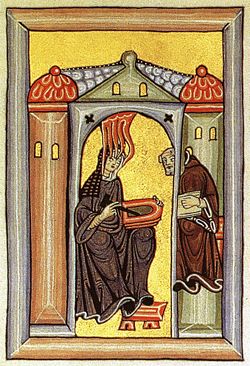Protestant Persecutions: Calvin
Thursday, September 30th, 2010
John Calvin
Protestant “reformers” did not have a particularly positive impact on reforming persecution.
Here is an observation from a 19th century account:
” If matters of fact can establish any certainty,” says a Christian writer of half a century ago, ” then it is certain that the two principal pillars of the Reformation, Martin Luther and John Calvin, and their confederate reformers, were influenced by the self-same spirit of cruelty and injustice which had influenced the ecclesiastical tyrants of every age from Diotrephes and the Alexandrian priesthood down to the same Luther and Calvin.” (Bennett, Bennett RM. The champions of the church: their crimes and persecutions. D.M. Bennett, 1878, p. 835)
These “pillars of the Reformation” did not act like the pillars of the New Testament Church.
Regarding the Calvinists, it has been reported:
Calvinism was established as the compulsory religion of the government in Holland, and a terrible war of persecution waged against all dissenters, Catholic and Protestant alike. (Bennett, p. 842)
“It is true,” says Mosheim, ” that many Anabaptists suffered death merely because they were judged to be incurable heretics, for in this century the error of limiting the administration of baptism to adult persons only, and the practice of re-baptizing such a* had received that sacrament in a state of infancy were looked upon as most flagitious and intolerable heresies.’
The other ” reformers ” also were not laggards in showing their irrepressible yearning for liberty of conscience. D Aubigne, himself a most partisan Protestant, admits that at Zurich fourteen men and seven women “were imprisoned ou an allowance of bread and water in the heretics’ tower.” The Protestants of Switzerland inclosed the poor Anabaptists in sacks and threw them into the Rhine, remarking in a playful manner ” That they were merely baptizing them by their own favorite mode of immersion ” (Meuzel).
The Calvinists emulated the zeal of the Lutherans, and were as tolerant as the adherents of the German monk. They called Lutherans sons of the devil, and drove them out of southern Germany, in a portion of which the Calvinists had gained the ascendency. ” More than a thousand Lutheran ministers,” says Olearius, i! were proscribed, with their wives and children, and reduced to beg the bread of charity.” In Switzerland, also, the laws enacted’ under the vigilant eye of Calvin were exceedingly tolerant—so much so, that through their beneficent operation several thousand people were imprisoned, exiled, or killed. (Bennett, pp. 846-847)
A man who dared to keep his hat on at the approach of Calvin was fined ; he that contradicted him was arraigned before the consistory and threatened with excommunication. (Bennett, p. 847)
One of the most influential Calvinists of the sixteenth century was Baron D’Adrets…Archbishop Spalding…says of him: ” His career was signalized by the celerity and success of his movements, but still more by the horrid sufferings…’He was, in regard to the Catholics, what Nero had been in regard to the early Christians.’ He sought out and invented the most novel punishments, which he took pleasure in seeing inflicted on those who fell into his hands. This monster, wishing to make his children as cruel as himself, forced them to bathe in the blood of the Catholics whom he had butchered; and these barbarities met with the approbation of the chief of the party.” (Bennett, p. 848)
” Many,” says Robinson, ” have pretended to apologize for Calvin, but what are his nostrums, which end in tyranny and murder, that the great voice of nature should be drowned in the din of a vain babbling about him ?’ Calvin’s heart never relented at the recollection of his many crimes—the burning of Servetus, the beheading of Ja«Les Gruet, the banishment of Castalio and Bolsec, and the thousands of other persecutions perpetrated in his theocracy…The persecuting spirit of Calvin was not confined to Geneva. It leaped like a blighting curse to Poland, to Scotland, to France. (Bennett, p. 849,850)
Thus, the “Refomers” were intolerant and murderous persecutors.
Those interested in learning more should consider studying the following articles:
Persecutions by Church and State This article documents some that have occurred against those associated with the COGs and some prophesied to occur. Will those with the cross be the persecutors or the persecuted–this article has the shocking answer.
The Similarities and Dissimilarities between Martin Luther and Herbert W. Armstrong This article clearly shows some of the doctrinal differences between in the two. At this time of doctrinal variety and a tendency by many to accept certain aspects of Protestantism, the article should help clarify why the Living Church of God is NOT Protestant. Do you really know what the Protestant Reformer Martin Luther taught and should you follow his doctrinal example?
John Calvin, Calvinism, TULIP, and What is Predestination? Who was John Calvin? Did he believe in sola Scriptura or did he hold to unbiblical doctines? TULIP analyzed.
Universal Offer of Salvation: There Are Hundreds of Verses in the Bible Supporting the Doctrine of True Apocatastasis Do you believe what the Bible actually teaches on this? Will all good things be restored? Does God’s plan of salvation take rebellion and spiritual blindness into account?
Sola Scriptura or Prima Luther? What Did Martin Luther Really Believe About the Bible? Though he is known for his public sola Scriptura teaching, did Martin Luther’s writings about the Bible suggest he felt that prima Luther was his ultimate authority? Statements from him changing and/or discounting 18 books of the Bible are included. Do you really want to know the truth?
Military Service and the Churches of God: Do Real Christians Participate in Carnal Warfare? Here are current and historical perspectives on a matter which show the beliefs of the true church on military participation. Is war proper for Christians?
Hope of Salvation: How the Living Church of God differ from most Protestants How the Living Church of God differs from mainstream/traditional Protestants, is perhaps the question I am asked most by those without a Church of God background.















































